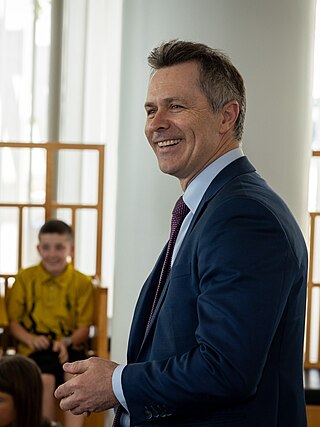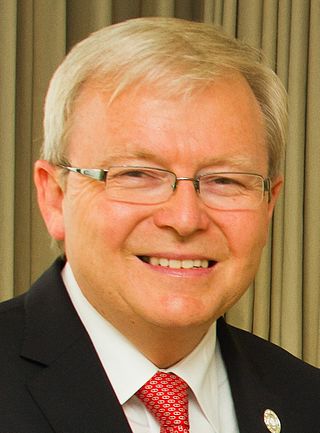
Julia Eileen Gillard is an Australian former politician who was the 27th prime minister of Australia and the leader of the Labor Party (ALP) from 2010 to 2013. Born in Barry, Wales and raised in Adelaide, she was the member of parliament (MP) for the Victorian division of Lalor from 1998 to 2013. She was also the 13th deputy prime minister of Australia from 2007 to 2010, under Kevin Rudd. She is the first and only woman to hold either office in Australian history.

Tanya Joan Plibersek is an Australian politician who has been Minister for the Environment and Water in the Albanese government since 2022. She was deputy leader of the Australian Labor Party (ALP) from 2013 to 2019 and has served as the Member of Parliament (MP) for Sydney since 1998. She previously held ministerial office in the Rudd and Gillard governments.
Same-sex marriage is legal in all parts of the United Kingdom. As marriage is a devolved legislative matter, different parts of the United Kingdom legalised at different times; it has been recognised and performed in England and Wales since March 2014, in Scotland since December 2014, and in Northern Ireland since January 2020. Civil partnerships, which offer most, but not all, of the rights and benefits of marriage, have been recognised since 2005. The United Kingdom was the 27th country in the world and the sixteenth in Europe to allow same-sex couples to marry nationwide. Polling suggests that a majority of British people support the legal recognition of same-sex marriage.

Penelope Ying-Yen Wong is an Australian politician who is serving as the minister for Foreign Affairs and leader of the Government in the Senate in the Albanese government since 2022. A member of the Australian Labor Party (ALP), she has been a senator for South Australia since 2002. Wong previously served as minister for Climate Change and minister for Finance and Deregulation during the governments of Prime Ministers Kevin Rudd and Julia Gillard from 2007 until 2013.

Boris Ottokar Dittrich is a Dutch politician, jurist, author and human rights activist who served as Leader of the Democrats 66 (D66) from 2003 to 2006. A former member of the House of Representatives (1994–2006), he has been a member of the Senate since 2019.
Joseph de Bruyn is an Australian trade union official. He is the former National President of the Shop, Distributive and Allied Employees Association (SDA) and a former member of the National Executive of the Australian Labor Party (ALP).
The Marriage Act 1961(Cth) is an Act of the Parliament of Australia which regulates marriage in Australia. Since its passage in 1961, it has been amended on numerous occasions and applies uniformly throughout Australia (including its external territories); and any law made by a state or territory inconsistent with the Act is invalid. The Act was made under the power granted to the federal parliament under section 51(xxi) of the Australian Constitution. Before the passage of the Act, each state and territory had its own marriage laws. The Act only recognises monogamous marriages that comply with the requirements of the Act; other forms of union, including traditional Aboriginal marriages, are not recognised. However, the Family Law Act 1975 treats de facto relationships and polygamous marriages as marriages for the purpose of recognising the rights of parties at a breakup. Since 2009, the Family Law Act 2009 has also recognised the property rights of each partner of de facto relationships on separation.
Same-sex marriage has been legal in New Zealand since 19 August 2013. A bill for legalisation was passed by the House of Representatives on 17 April 2013 by 77 votes to 44 and received royal assent on 19 April. It entered into force on 19 August, to allow time for the Department of Internal Affairs to make the necessary changes for marriage licensing and related documentation. New Zealand was the first country in Oceania, the fourth in the Southern Hemisphere, and the fifteenth in the world to allow same-sex couples to marry. Civil unions have also been available for both same-sex and opposite-sex couples since 2005.

Lesbian, gay, bisexual, transgender, and queer (LGBTQ) rights in Australia rank among the highest in the world; having significantly advanced over the latter half of the 20th century and early 21st century. Opinion polls and the Australian Marriage Law Postal Survey indicate widespread popular support for same-sex marriage within the nation. Australia in 2018, in fact was the last of the Five Eyes set of countries - that consisted of namely Canada (2005), New Zealand (2013), United Kingdom (2014) and the United States (2015) to legalize same-sex marriage. A 2013 Pew Research poll found that 79% of Australians agreed that homosexuality should be accepted by society, making it the fifth-most supportive country surveyed in the world. With its long history of LGBTQ activism and annual Gay and Lesbian Mardi Gras festival, Sydney has been named one of the most gay-friendly cities in the world.
Same-sex marriage has been legal in Australia since 9 December 2017. Legislation to allow it, the Marriage Amendment Act 2017, passed the Parliament of Australia on 7 December 2017 and received royal assent from Governor-General Peter Cosgrove the following day. The law came into effect on 9 December, immediately recognising overseas same-sex marriages. The first same-sex wedding under Australian law was held on 15 December 2017. The passage of the law followed a voluntary postal survey of all Australians, in which 61.6% of respondents supported legalisation of same-sex marriage.
Christopher Patrick Hayes is a former Australian Labor Party politician who served as the member of parliament for Werriwa from 2005 to 2010 and then as the member for Fowler from 2010 to 2022, when he retired from politics.

Jason Dean Clare is an Australian politician serving as Minister for Education since 1 June 2022. He is a member of the Australian Labor Party (ALP) and has represented the Division of Blaxland in Western Sydney since 2007.
Cyprus has recognised same-sex civil unions since 9 December 2015. Legislation to establish a form of partnership known as civil cohabitation was introduced by the ruling Democratic Rally party in July 2015, and approved by the Cypriot Parliament in a 39–12 vote on 26 November 2015. It was signed by President Nicos Anastasiades, and took effect on 9 December upon publication in the government gazette.

Equal Love is an Australian-wide campaign initiated by the Victorian Gay and Lesbian Rights Lobby in an attempt to win gay and lesbian couples marriage rights in the country. The campaign involves a range of community, union, student and activist organisations whose aim is to influence public and government attitudes towards LGBTQ couples through education and direct action.
Australian Marriage Equality (AME) was an advocacy group driven by volunteers who came together to pursue the legalisation of same-sex marriage in Australia. AME partnered with a diverse range of organisations and supporters across the country to end the exclusion of same-sex LGBTIQ couples from marriage in Australia. It was the pre-eminent group campaigning for same-sex marriage in Australia.

The Gillard government was the Government of Australia led by the 27th prime minister of Australia, Julia Gillard, of the Australian Labor Party. The Gillard government succeeded the first Rudd government by way of the Labor Party leadership spill, and began on 24 June 2010, with Gillard sworn in as prime minister by the governor-general of Australia, Quentin Bryce. The Gillard government ended when Kevin Rudd won back the leadership of the Australian Labor Party on 26 June 2013 and commenced the second Rudd government.

A leadership spill in the Australian Labor Party, the party then forming the Government of Australia, took place on 26 June 2013 at 7:00pm AEST. Prime Minister Julia Gillard called a ballot for Leader and Deputy Leader of the Labor Party live on Sky News Australia at 4:00pm, following persistent leadership tensions. She stated that she would retire from politics if she lost the vote, while calling on any would-be challengers to pledge to do the same if they lost. In a press conference held shortly after Gillard's announcement, backbencher and former Prime Minister Kevin Rudd announced that he would challenge Gillard, whilst also pledging to step down if he did not win the vote. At the ALP caucus meeting, Rudd was elected Leader of the Labor Party, with the caucus voting 57–45 in his favour.
A referendum on banning same-sex marriage was held in Slovakia on 7 February 2015. Critics claimed the referendum was pushed by religious and conservative organisations, aiming to block gay couples from gaining more rights.
The Australian Labor Party National Conference, sometimes referred to as the National Party Conference or the Federal Conference, is the highest representative and decision-making body of the Australian Labor Party, incorporating all of the party’s state and territory branches. The National Conference takes place triennially and is hosted in Australian cities on a rotating basis. The 49th and most recent National Party Conference was held on the 17th to the 19th of August 2023 at the Brisbane Convention and Exhibition Centre and was attended by over 2,000 delegates.
The history of same-sex marriage in Australia includes its express prohibition by the Howard government in 2004 and its eventual legalisation by the Parliament in December 2017. Although a same-sex marriage law was passed by the Australian Capital Territory in 2013, it was struck down by the High Court on the basis of inconsistency with federal law. The Court's decision closed the possibility of concurrent state or territory laws that would allow same-sex marriage where federal law did not. A law legalising same-sex marriage passed the Parliament on 7 December 2017 and received royal assent the following day.








